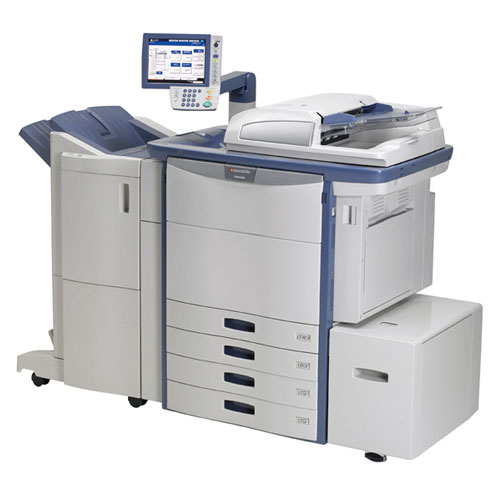Used Commercial Copiers for Sale: Find Affordable Quality Machines
Find Affordable Quality Machines
If you’re in the market for a commercial copier, you might be considering purchasing a used one. Used commercial copiers can offer a cost-effective solution for businesses looking to save money without compromising on functionality. In this article, we will explore the benefits of buying used commercial copiers, things to consider before making a purchase and provide valuable tips to help you find the best deals.

Table of Contents
Introduction: Why Choose Used Commercial Copiers?
Factors to Consider When Buying a Used Commercial Copier
Understanding the Condition of the Copier
Researching Reputable Sellers and Dealers
Evaluating the Copier’s Features and Specifications
Determining the Copier’s Compatibility and Connectivity
Comparing Pricing and Negotiating a Deal
Assessing the Copier’s Maintenance History and Service Options
Reviewing Warranty and Return Policies
Tips for Extending the Lifespan of a Used Commercial Copier
Common Misconceptions about Used Copiers
Frequently Asked Questions (FAQs)
Conclusion
FAQs
1. Introduction: Why Choose Used Commercial Copiers?
Purchasing a used commercial copier can be a practical choice for businesses that need advanced features and functionality while working within a limited budget. Here are some key reasons why opting for a used copier may be the right decision for your business:
Cost Savings: Used copiers are significantly cheaper than brand-new ones, allowing you to allocate your budget to other important areas of your business.
Quality Equipment: Many used copiers have low usage and are well-maintained, providing reliable performance similar to new machines.
Upgraded Features: Buying a used copier gives you access to advanced features that may have been expensive when the copier was first released.
Eco-Friendly Option: By purchasing a used copier, you contribute to reducing electronic waste and promoting sustainability.
2. Factors to Consider When Buying a Used Commercial Copier
Before finalizing your purchase, it’s crucial to consider several factors to ensure you get the best value for your money. Here are some important aspects to keep in mind:
2.1 Understanding the Condition of the Copier
Inspect the copier thoroughly to assess its condition. Look for signs of wear and tear, such as scratches or dents. Test the copier’s functionality, including scanning, printing, and copying, to ensure it meets your requirements.
2.2 Researching Reputable Sellers and Dealers
Work with trusted sellers or dealers who have a good reputation for selling high-quality used copiers. Check online reviews, seek recommendations from colleagues, and ask for references to ensure a reliable purchase.
2.3 Evaluating the Copier’s Features and Specifications
Consider the specific features and specifications you need in a copier. Assess factors such as printing speed, paper capacity, duplexing capabilities, and document finishing options to find a copier that aligns with your business needs.
2.4 Determining the Copier’s Compatibility and Connectivity
Ensure that the copier is compatible with your existing office infrastructure and network. Check if it supports the required software and connectivity options, such as USB, Ethernet, or wireless connectivity.
2.5 Comparing Pricing and Negotiating a Deal
Research the market value of similar copier models to determine a fair price. Be prepared to negotiate with the seller, leveraging the copier’s condition, age, and any additional accessories included in the deal.
2.6 Assessing the Copier’s Maintenance History and Service Options
Request information about the copier’s maintenance history, including any repairs or servicing performed. A well-maintained copier with regular servicing is likely to offer better long-term performance.
2.7 Reviewing Warranty and Return Policies
Check if the used copier comes with any warranty or return policies. Understand the terms and conditions to protect yourself from unexpected issues after the purchase.
3. Tips for Extending the Lifespan of a Used Commercial Copier
To maximize the lifespan and performance of your used commercial copier, consider implementing the following tips:
Regular Cleaning: Keep the copier clean by removing dust, debris, and paper particles to prevent paper jams and other performance issues.
Proper Usage: Follow the manufacturer’s guidelines for optimal usages, such as recommended paper types, load capacities, and operating temperature ranges.
Scheduled Maintenance: Arrange regular maintenance and servicing to identify and address potential issues before they escalate.
Firmware Updates: Stay updated with the latest firmware releases from the manufacturer to ensure optimal performance, security, and compatibility.
Employee Training: Provide training to your staff on using the copier correctly, including paper loading, troubleshooting common issues, and utilizing advanced features.
4. Common Misconceptions about Used Copiers
Let’s address some common misconceptions surrounding used copiers:
4.1 Used Copiers Are Unreliable
Contrary to this belief, used copiers can offer reliable performance if purchased from reputable sellers and properly maintained. Thoroughly inspecting the copier and assessing its condition can help you identify a reliable machine.
4.2 Used Copiers Lack Technical Support
Many reputable sellers and manufacturers provide technical support for used copiers, including troubleshooting assistance and spare parts availability. Research and choose a seller who offers post-purchase support.
4.3 Used Copiers Have Outdated Technology
Used copiers can still have advanced features and functionality. Technology advancements have made older models capable of performing tasks similar to newer machines. Research well and find a used copier with features that meet your requirements.
Conclusion
Purchasing a used commercial copier can be a smart choice for businesses seeking cost savings without compromising on quality. By understanding the condition of the copier, researching reputable sellers, evaluating features, and considering compatibility, you can find a reliable and affordable machine that meets your business needs. Remember to implement proper maintenance practices to extend the copier’s lifespan and performance.
FAQs
Are used commercial copiers covered by a warranty?
While warranties may vary depending on the seller and model, some used copiers come with limited warranties. Review the terms and conditions before making a purchase.
Can I negotiate the price of a used commercial copier?
Yes, negotiating the price is often possible when buying a used copier. Research the market value and use the copier’s condition as leverage during negotiations.
What should I look for when inspecting a used copier?
Look for signs of wear and tear, test the copier’s functionality, and inquire about its maintenance history. Additionally, ensure compatibility with your office infrastructure.
Are there any risks involved in purchasing a used copier?
While there are risks associated with any used equipment purchase, conducting thorough research, buying from reputable sellers, and understanding return policies can minimize these risks.
How can I find reputable sellers for used commercial copiers?
Read online reviews, seek recommendations from colleagues or industry professionals, and verify the seller’s reputation before making a purchase.





